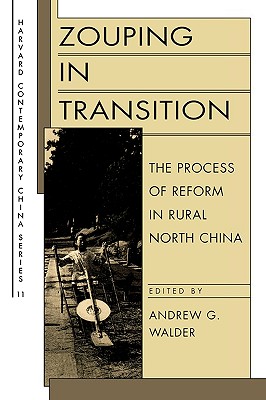

 Harvard University Press
Harvard University Press
Zouping in Transition: The Process of Reform in Rural North China


Key Metrics
- Andrew G Walder
- Harvard University Press
- Paperback
- 9780674968561
- 8.9 X 5.98 X 0.72 inches
- 0.83 pounds
- Political Science > Public Policy - Economic Policy
- English
 Secure Transaction
Secure TransactionBook Description
Zouping offers important general lessons for the study of China's rural transformation. The authors in this volume, all participants in a unique field research project undertaken from 1988 to 1992, address questions that are far from simple and about which there is some controversy.
The questions are grouped around two issues. The first is the role of local governments as economic actors. What is this role, how have they played it, and how can we explain their behavior? Have they dominated rural economies through public ownership of industry and local planning, or has the role of local governments diminished with the rise of market transactions and private ownership? The second issue is market reform and inequality. Have rural cadres enjoyed income advantages in the new market environment? Has the provision of such collective services as education and health care declined, leading to new forms of inequality?
The chapters on the role of local government all point to a single conclusion: one cannot explain the rapid development of Zouping without reference to the role of local governments and of local government officials as economic actors. Scholarly writings about the transitional economies have often ignored or distorted this aspect of China's reform experience. On the second issue, changes in inequality owing to market reform, the authors present mixed findings but contribute rich new data to the research on this issue.
Author Bio
Andrew G. Walder is the Denise O'Leary and Kent Thiry Professor in the School of Humanities and Sciences, and Senior Fellow in the Freeman Spogli Institute for International Studies. Previously, he served as chair of the Department of Sociology, as director of the Walter H. Shorenstein Asia-Pacific Research Center, and as Director of the Division of International, Comparative and Area Studies in the School of Humanities and Sciences.
A political sociologist, Walder has long specialized on the sources of conflict, stability, and change in communist regimes and their successor states. His publications on China have ranged from the political and economic organization of the Mao era to changing patterns of stratification, social mobility, and political conflict in the post-Mao era.
Another focus of his research has been on the political economy of Soviet-type economies and their subsequent reform and restructuring. His current research focuses on popular political mobilization in late-1960s China and the subsequent collapse and rebuilding of the Chinese party-state.
Walder joined the Stanford faculty the fall of 1997. He received his PhD in sociology at the University of Michigan in 1981 and taught at Columbia University before moving to Harvard in 1987. As a professor of sociology, he served as chair of Harvard's MA Program on Regional Studies-East Asia for several years.
From 1995 to 1997, he headed the Division of Social Sciences at the Hong Kong University of Science and Technology. From 1996 to 2006, as a member of the Hong Kong Government's Research Grants Council, he chaired its Panel on the Humanities, Social Sciences, and Business Studies.
His recent publications include Agents of Disorder: Inside China's Cultural Revolution(Harvard University Press, 2019); "The Impact of Class Labels on Life Chances in China" (with Donald J. Treiman), American Journal of Sociology(2019); "The Dynamics of Collapse in an Authoritarian Regime: China in 1967" (with Qinglian Lu) American Journal of Sociology(2017); China Under Mao: A Revolution Derailed (Harvard University Press, 2015); "After State Socialism: The Political Origins of Transitional Recessions" (with Andrew Isaacson and Qinglian Lu), American Sociological Review(2015); "Rebellion and Repression in China, 1966-1971," Social Science History(2014); Fractured Rebellion: The Beijing Red Guard Movement (Harvard University Press, 2009); "Revolution, Reform, and Status Inheritance: Urban China, 1949-1996" (with Songhua Hu), American Journal of Sociology (2009); "Ownership, Organization, and Income Inequality: Market Transition in Rural Vietnam" (with Giang Hoang Nguyen) American Sociological Review (2008); "Ambiguity and Choice in Political Movements: The Origins of Beijing Red Guard Factionalism," American Journal of Sociology (2006); and "Political Sociology and Social Movements," in Annual Review of Sociology (2009).
Source: Stanford University School of Humanities and Sciences
Videos
No Videos
Community reviews
Write a ReviewNo Community reviews